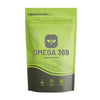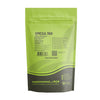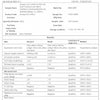Product Details
Scientific evidence suggests that fish oil reduces high triglycerides, helping to support the heart function when taken in the recommended amounts. Containing omega-3 fatty acids, this plays an essential role in brain function, inflammation and growth providing you with a better quality of living.
Promoting a healthy lifestyle - Fish oil is an excellent source of omega 3 which can help stabilise cholesterol levels in the body. Daily consumption can help boost the immune system defending against cold, coughs and the flu.
Supports skin health - Helps improve the condition of dry skin and can assist in treating problems such as irritated skin, eczema and rashes.
Omega 369 is the combination of Omega-3, Omega-6, and Omega-9.
The fatty acids in omega-3 are polyunsaturated fatty acids. These are essential fatty acids due to the fact that the body is unable to synthesize them. These fatty acids are found in highest concentrations in plant oils and marine life. Squid oils, fish oils, and algae oil all serve as effective omega-3 sources. Other sources of omega-3 that have it in high amounts include both echium oil and flax seed oil. The body requires omega-3 fatty acids to regulate its’ metabolism. These fatty acids are also crucial for the natural and healthy development of the human body.
The fatty acids in omega-6 are polyunsaturated fatty acids. These fats are connected together through numerous double bonds. Alternative, monounsatured fatty acids are connected through a single bond. Omega-6 fatty acids are also classified as essential fatty acids as the body cannot synthesize them. Omega-6 is obtained through diet for the body to function at optimal levels and to be as healthy as possible.
The fatty acids in omega-9 are mono-unsaturated fatty acids. These fats feature a single bond and are not essential fatty acids as the body is capable of synthesizing them. Omega-9 is found in both plants and animals. Some examples of oils that are high in omega-9 content include peanut, olive, and canola oil. Olive oil is a prominent example as it includes upwards of 80% oleic acid, which is one of the two main types of omega-9 fatty acids. Oleic acid can also be found in many different foods as it serves as an alternative for other sources of fat that are highly saturated. Oleic acid is viewed as the highest abundance option of fatty acid in existence.
Fish oils are the basis of many people’s supplement regimen, and for good reason. They provide omega 3 polyunsaturated fatty acids which are essential for general health and wellbeing. These ‘good’ fats are used for almost every bodily function and need to be consumed through the diet.
Omega-3 fatty acids, also referred to as PUFAs (n-3 polyunsaturated fatty acids) are essential fatty acids, which cannot be produced by the human body even though they are beneficial. This is why these fatty acids have to be taken from food. Omega-3 fatty acids are found in tuna, mackerel, sturgeon, salmon, bluefish, mullet, sardines, anchovy, trout, herring, menhaden and sardines. 3.5 ounces of these fish species provide around 1 gram of Omega 3. In order to prevent spoilage, Omega 3 supplements also contain a small quantity of vitamin E. Besides, they can be combined with iron, vitamins A, B, C, D and calcium.
The most important omega-3 fatty acids are:
- Alpha-linoleic acid (ALA) – found in virtually all kinds of foods
- Eicosapentaenoic acid (EPA) – found in fish
- Docosahexaenoic acid (DHA) – found in both seaweed and fish
As mentioned above, ALA can be found in various foods, such as green leafy vegetables, vegetable oils (flaxseed, soybean and canola), seeds, beans and nuts. When ALA is ingested, small amounts of it are usually converted into DHA and EPA. The main sources of DHA and EPA are fatty fish and fish oil such as herring, tuna, salmon and mackerel. Vegetarians can take their daily Omega-3 fatty acids from algae oils or from dietary supplements that are available under the form of oils and capsules. The most popular supplements usually include flaxseed oil, walnut oil and fish oil.
All body cells are protected with a cell membrane. Fatty acids make up a majority of the membrane. Fatty acids are broken down into either unsaturated or saturated. Unsaturated fats turn to liquid when present in room temperature, while saturated fats remain solid. If a diet includes too much saturated fat, it will cause cell membranes to be constructed with a lack of fluidity and generally poor composition. A diet that includes a lot of unsaturated fat, it will cause the cell membranes to be constructed with a high level of fluidity. Every type of fatty acid plays a role in the construction of cell membranes and other bodily functions. Studies have proven that the fatty acids from omega-3 play a role into cell growth due to their effects on certain enzymes.
The body also needs fatty acids from omega-6 fats because they help with the structural development of both cell membranes and cell walls. These fatty acids also assist in the metabolic process where prostaglandins are created. These serve similarly to hormones and can work to stop or worsen inflammation. The body utilizes prostaglandins for the purpose of managing inflammation, dilating blood vessels, and keeping the immune system functioning properly. As does the other two omega fatty acids, omega-6 fatty acids play a factor into the brain’s functioning, the body’s metabolism, and health of both bones and the reproductive system.
The body is capable of making small amounts of omega-9 fatty acids. However, this cannot be accomplished unless the body is getting sufficient amounts of omega-3 and omega-6 fatty acids. The body will be unable to create sufficient omega-9 fatty acids if there is a deficit in either of the two other types of omega fatty acids. Therefore, while not technically an essential fatty acid, it may act as one if the body is not receiving all that it should each day.
Key benefits
 Supports brain, eye and heart health
Supports brain, eye and heart health Highly purified to remove toxins
Highly purified to remove toxins With added vitamin E
With added vitamin E Sustainably sourced.
Sustainably sourced. Premium quality pharmaceutical grade ingredients
Premium quality pharmaceutical grade ingredients
Ingredients
Fish Oil (18%EPA/12%DHA) 400mg, Flaxseed Oil 300mg, Sunflower Seed Oil 290mg, Vitamin E (dl-Alpha-Tocopheryl Acetate) 10mg, Gelatin, Glycerine, Purified Water
How to use
Take one to two capsules daily. Take as a food supplement or as directed by a healthcare professional.
If you are taking any prescribed medication or have any medical conditions always consult your doctor or pharmacist before taking vitamins or supplements.
Keep out of sight and reach of young children.
Do not exceed stated recommended intake.
Food supplements must not be, and are not intended to be used as a substitute for a varied and balanced diet and a healthy lifestyle.
Store in a cool, dry place.
If you experience an adverse reaction, stop taking the supplement and seek medical advice.
Dietary Suitability
Diabetic Suited
Gluten Free
Halal
Kosher
Lactose Free
Shipping & Returns
Returns Policy
You may return most new, unopened items within 30 days of delivery for a full refund. We'll also pay the return shipping costs if the return is a result of our error (you received an incorrect or defective item, etc.).
You should expect to receive your refund within four weeks of giving your package to the return shipper, however, in many cases you will receive a refund more quickly. This time period includes the transit time for us to receive your return from the shipper (5 to 10 business days), the time it takes us to process your return once we receive it (3 to 5 business days), and the time it takes your bank to process our refund request (5 to 10 business days).
If you need to return an item, simply login to your account, view the order using the 'Complete Orders' link under the My Account menu and click the Return Item(s) button. We'll notify you via e-mail of your refund once we've received and processed the returned item.
Shipping
We can ship to virtually any address in the world. Note that there are restrictions on some products, and some products cannot be shipped to international destinations.
When you place an order, we will estimate shipping and delivery dates for you based on the availability of your items and the shipping options you choose. Depending on the shipping provider you choose, shipping date estimates may appear on the shipping quotes page.
Please also note that the shipping rates for many items we sell are weight-based. The weight of any such item can be found on its detail page. To reflect the policies of the shipping companies we use, all weights will be rounded up to the next full pound.
Customer Reviews
Customer Reviews
As Seen In






Our Promise
-

-
NO ARTIFICIAL
SWEETENERS
-

-
NO ARTIFICIAL
COLOURING
-

-
GLUTEN FREE
& NON GMO
-

-
NO ARTIFICIAL
PRESERVATIVES












